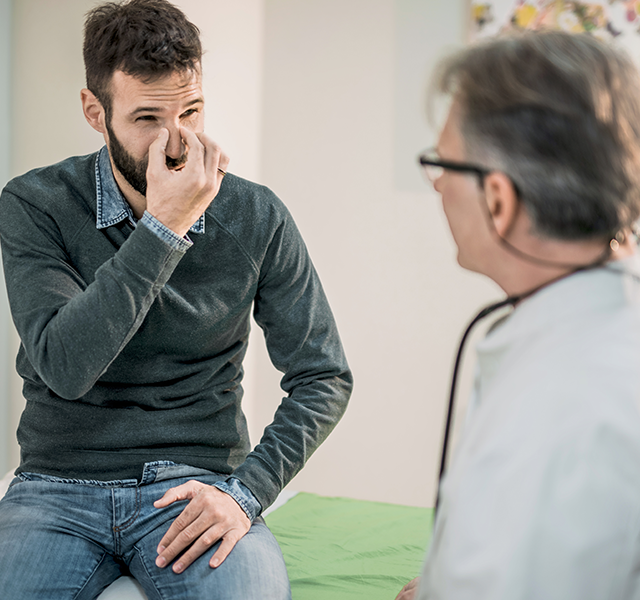If you suffer from nasal polyps, you may have tried several different treatments. You also may have experienced little, or only temporary, relief from those treatments.
“Nasal polyps are like weeds,” says Amrita Ray, D.O., an otolaryngologist at Henry Ford Health. “Sometimes you have to try a lot of methods before you can get rid of them and stop them from growing back.”
Biologics are a newer category of drugs being used to treat some people with nasal polyps. For the right candidates, they can provide relief with very few side effects.
What Are Nasal Polyps
Nasal polyps are benign (noncancerous) growths that develop inside the lining of the nasal passages. They are often associated with chronic inflammation, allergies and asthma.
When they’re small, they often don’t cause any symptoms, and you might not even know you have them. If nasal polyps grow larger, they can start to create problems. You might experience:
- Congestion
- Runny nose
- Sinus pressure
- Snoring
- Worsening asthma
Nasal Polyp Treatments
If nasal polyps are causing symptoms and interfering with your quality of life, there are several types of treatments that may help. “Biologics can be very effective, but they aren’t typically the first line of treatment,” says Dr. Ray. “Usually, we’ll try other therapies first and see how the polyps respond.”
Other treatment methods for nasal polyps include:
- Oral steroids or steroid nasal sprays/rinses to reduce inflammation
- Surgery to remove them
How Do Biologics Treat Nasal Polyps?
Biologics are a unique treatment option for those who don’t respond well to steroids or whose polyps grow back after surgery. Biologic medications target specific chemical components of the inflammatory system. By reducing these chemicals, they relieve inflammation and shrink polyps.
“Biologics can also help reduce growth of new polyps,” says Dr. Ray. “That’s why we often use them after surgery to stop polyps from coming back.”

ENT Care At Henry Ford
What to Expect From Biologic Treatment
Before biologics are even an option, you will likely have to try several other methods to treat nasal polyps. Working with your allergist or ear, nose and throat (ENT) doctor, you’ll decide if—and when—biologics might be a good option.
If oral and nasal steroids haven’t successfully shrunk the polyps, surgery is often the next step, depending on the severity of your symptoms. “But removing polyps once doesn’t always get rid of them,” says Dr. Ray. “For some people, polyps are like very aggressive weeds that just keep coming back.”
Using biologics doesn’t negate the need for surgery, but it may help you avoid repeated surgeries. “We don’t often use biologics prior to surgery, but after surgery it can be very effective,” says Dr. Ray.
Typically, you’ll receive biologics via injection. You’ll receive the first one in your doctor’s office so they can monitor you for signs of an allergic reaction. After that, you can give yourself the injections at home.
A course of treatment can vary in length and in frequency of injections. On average, you might do injections once every two to four weeks. Sometimes, you may be able to stop taking them after six to 12 months. Other people may need to stay on the medication longer.
Benefits of Biologics for Nasal Polyps
The biggest benefit of biologics is their effectiveness and ease of use.
“Oral steroids can produce systemic effects that impact your bone health, worsen diabetes and mess with hormones,” says Dr. Ray. Steroid nasal sprays and irrigations rarely have those systemic effects, but they do require commitment. “They need to be used consistently, usually every day, to maintain results.”
Comparatively, taking biologics once or twice a month has a much lower risk of side effects. Rarely, someone might have an allergic reaction. More common is a mild reaction at the injection site, headaches or dry eyes. But because they don’t broadly suppress the entire immune system, other side effects are rare.
If you are struggling to get long-term relief from nasal polyps, talk to your doctor about whether you should try biologics.
Reviewed by Amrita Ray, D.O., an otolaryngologist and sinus surgery specialist at Henry Ford Health.



